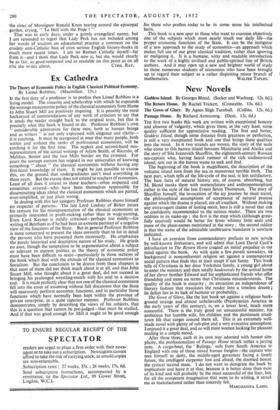Ex Cathedra
The Theory of Economic Policy in English Classical Political Economy. By Lionel Robbins. (Macmillan. 15s.) IF the first duty of a professor is to profess then Lionel Robbins is a living model. The sincerity and scholarship with which he expounds the writings on economic policy of the classical economists from Hume to John Stuart Mill are positively inspiring. It is possibly the most hackneyed of commendations of any work of criticism to say that it sends the reader straight back to the original texts, but that is precisely what this book is bound to do. Professor Robbins's own " considerable admiration for these men, both as human beings and as writers " is not only expressed with elegance and clarity— it is catching. It must be recognised at once that many people, both within and without the ranks of professional economists, will be catching it for the first time. The neglect and second-hand mis- representation of the actual writings of Adam Smith, of Ricardo, of Malthus, Senior and the two Mills border on the criminal. For years the corrupt custom has reigned in our universities of knowing something " about " the classical economists without having any first-hand knowledge of them. It might be just possible to excuse this, on the ground that undergraduates can't read everything in three years. But the excuse does not extend to teachers of economics. Least of all does it extend to those teachers—often respected and sometimes revered—who have been themselves responsible for disseminating ideas about the classical economists which are partial, over-simplified, or just plain wrong.
In dealing with this last category Professor Robbins shows himself no respecter of persons. The late Lord Lindsay of Birker incurs his censure for his misrepresentation of the classical economists as primarily interested in profit-making rather than in wage-earning. Even Lord Keynes is mildly criticised—perhaps too mildly—for writing of Bentham as if he had been an extreme partisan of a negative view of the functions of the State. But in general Professor Robbins is more concerned to present the ideas correctly than to list in detail the persons who have presented them incorrectly. He emphasises the purely historical and descriptive nature of his study. He grinds no axes, though the temptation to be argumentative about a subject so relevant to current politics as the theory of economic policy must have been difficult to resist—particularly in those sections of the book which deal with the attitude of the classical economists to Socialism. But the conclusion to be drawn from these chapters is that most of them did not think much about it at all, and that John Stuart Mill, who thought about it a great deal, did not succeed in bringing his prolonged wrestling-match with his soul to a decisive end. It is made perfectly clear that not one of the classical economists fell into the error of assuming without full discussion that the State will necessarily perform economic functions, and in particular those functions which have normally been kept within the province of private enterprise, in a quite superior manner. Professor Robbins demonstrates, simply by describing the views of his subjects, that this is a question that cannot be pre-judged—that must be studied. And if that was good enough for Mill it ought to be good enough for those who profess today to be in some sense his intellectual heirs.
This book is a new spur to those who want to examine objectively one of the subjects which most nearly touch our daily life—the proper economic functions of the State. It can be the instigator of a new approach to the study of economics—an approach which makes full use of our great classical tradition, rather than ignoring or maligning it. It is a humane, witty and readable introduction to the work of a highly civilised and public-spirited line of British authors. And it may open up a new and brighter world of study to those numerous students of economics who have been brought up to regard their subject as a rather dispiriting minor branch of


































 Previous page
Previous page